Filter by...
Reset all
Publications (204)
Book Chapter
From the book:
How States Respond to Crisis
Working Paper
pdf
– A study of small, medium, and micro enterprises
This study measures the VAT compliance gap for small and medium-sized entities in Tanzania. Specifically, the study measures the under-reporting component of the VAT compliance gap. This study uses VAT declaration and audit data to conduct a bottom-up estimation to measure the extent of VAT...
Journal Article
This peer-reviewed research is available free of charge. UNU-WIDER believes that research is a global public good and supports Open Access.
Technical assistance and increased use of ICT in tax administrations hold promise for greater revenue collection. Yet, the evidence on how these activities work in the real-world circumstances of developing countries is scant. The paper attempts to fill this gap by evaluating an intervention...
Book Chapter
Public social insurance is part of the broader social protection “toolbox”, typically understood to comprise also social assistance measures (such as cash transfers, benefits in kind, fuel subsidies and so on), social services and public works (see, for example, Carter et al. 2019). Until recently...
Report
pdf
This report documents ZANMOD, the SOUTHMOD model developed for Zanzibar. This work was carried out by staff at Zanzibar University, the Second Vice President’s Office in Zanzibar, the University of Dar es Salaam, and the University of Dodoma, in collaboration with UNU-WIDER and SASPRI. The results...
Report
pdf
This report documents TAZMOD, the SOUTHMOD model developed for Tanzania Mainland. This work was carried out by University of Dar es Salaam in collaboration with the project partners. The results presented in this report are derived using TAZMOD version 2.9, which is part of the SOUTHMOD bundle...
Working Paper
pdf
– Re-thinking the use of unit values or community prices
Analysis of household food consumption patterns and welfare requires knowledge of household demand responses to changes in price and income. Estimation of the price and expenditure elasticities requires detailed data on household purchases and prices, which are often not available in many developing...
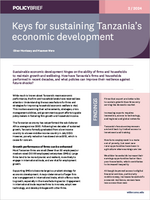
Sustainable economic development hinges on the ability of firms and households to maintain growth and wellbeing. How have Tanzania’s firms and households performed in recent decades, and what policies can improve their resilience against future shocks?Firms that export are better able to sustain...
Book Chapter
This peer-reviewed research is available free of charge. UNU-WIDER believes that research is a global public good and supports Open Access.
From the book:
Sustaining Tanzania's Economic Development
Book Chapter
This peer-reviewed research is available free of charge. UNU-WIDER believes that research is a global public good and supports Open Access.
From the book:
Sustaining Tanzania's Economic Development
Book Chapter
This peer-reviewed research is available free of charge. UNU-WIDER believes that research is a global public good and supports Open Access.
From the book:
Sustaining Tanzania's Economic Development
Book Chapter
This peer-reviewed research is available free of charge. UNU-WIDER believes that research is a global public good and supports Open Access.
From the book:
Sustaining Tanzania's Economic Development
Book Chapter
This peer-reviewed research is available free of charge. UNU-WIDER believes that research is a global public good and supports Open Access.
From the book:
Sustaining Tanzania's Economic Development
Book Chapter
This peer-reviewed research is available free of charge. UNU-WIDER believes that research is a global public good and supports Open Access.
From the book:
Sustaining Tanzania's Economic Development
Book Chapter
This peer-reviewed research is available free of charge. UNU-WIDER believes that research is a global public good and supports Open Access.
From the book:
Sustaining Tanzania's Economic Development
Book Chapter
This peer-reviewed research is available free of charge. UNU-WIDER believes that research is a global public good and supports Open Access.
Upgrading and multi-scalar industrial policy in the Tanzanian textile and apparel sector value chain
From the book:
Sustaining Tanzania's Economic Development
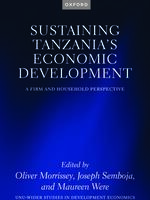
– A firm and household perspective
This book addresses performance and strategies adopted by firms and households in Tanzania to navigate shocks and achieve sustainability. How successful have firms and households been in building resilience to sustain their growth and development? Has the ability to navigate successfully through...
Journal Article
This peer-reviewed research is available free of charge. UNU-WIDER believes that research is a global public good and supports Open Access.
– A cross-sectoral analysis from a gender perspective
Mainland Tanzania has seen two decades of significant social policy reforms and transformations in its social and economic structures, whilst the country continues to grapple with persisting gender inequalities. This article examines Tanzania's social policy developments from a gender perspective...

– Latest addition to the SOUTHMOD programme
ZANMOD, the tax-benefit microsimulation model for Zanzibar, was launched in November 2023. The model will aid local authorities and researchers in understanding how taxation and social protection policies can be improved to reduce poverty and enhance equality.The research and coding work for the...
Working Paper
pdf
– A comparative perspective
We examine the distributional effects of the COVID-19 pandemic and associated tax-benefit measures in seven sub-Saharan African countries, focusing on the onset of the crisis.We evaluate impacts on disposable incomes, considering variations across income groups; assess the effectiveness of tax...
Working Paper
pdf
– The case study of a foreign-owned mining operation in Tanzania
Based on a case study of an anonymous mining company in Tanzania, this study assesses the implementation of the local content (LC) regulations and guidelines in the country. The analysis focused on the key LC aspects of the direct workforce (employment and training), procurement of goods and...
Report
pdf
This report documents TAZMOD, the SOUTHMOD model developed for Tanzania Mainland. It describes the different tax–benefit policies in place, how the microsimulation model picks up these different provisions, and the database on which the model runs. It concludes with a validation of TAZMOD results...
Working Paper
pdf
We study the effectiveness of social protection benefits in reducing income and consumption poverty in five sub-Saharan African countries—Ghana, Mozambique, Tanzania, Uganda, and Zambia—in normal times and times of widespread economic crisis. Using tax–benefit microsimulation models with...
Working Paper
pdf
– Empirical evidence
This paper examines trends and determinants of gross domestic savings in Tanzania using data for the period 1990–2020. The autoregressive distributed lag approach is employed to empirically analyse the short-run and long-run relationships. There has been a fairly stable increase in the domestic...
Working Paper
pdf
In a bid to realize its development aspirations, Tanzania has made concerted efforts to increase public investment, particularly in the last decade. A significant proportion of these investments are financed by contracting debt, manifested by the rapid accumulation of public debt, especially...
Working Paper
pdf
Expansion of social protection reach among workers in the large informal economy represents a persisting and thorny challenge in the development context. In Mainland Tanzania, several domestically led policy reforms have been introduced to increasingly expand social protection for informal workers...
Working Paper
pdf
– Exploring past policy trajectories and simulating future paths
Tanzania has expanded its social protection framework significantly over the past decade, but the country continues to grapple with important gender inequalities. This paper examines, first, the evolution and effects of Tanzania’s social protection policies since the 2000s, from the perspective of...
Report
pdf
View the latest TAZMOD country report here. This report documents TAZMOD, the SOUTHMOD model developed for Tanzania. It describes the different tax–benefit policies in place, how the microsimulation model picks up these different provisions, and the database on which the model runs. It concludes...
Working Paper
pdf
Tanzania has experienced relatively strong and stable economic growth accompanied by social stability over the past two decades. The country is also pursuing an ambitious development plan with significant employment objectives. For development to be fully inclusive, specific attention must be paid...
Working Paper
pdf
There has been much discussion on climate change and its adverse effects on agriculture, including excessive loss of food production. In regions such as sub-Saharan Africa, where agriculture is the major source of household livelihoods, shocks in weather patterns affect farmers’ expectations of farm...
Working Paper
pdf
– Implications for policy
This paper analyses factors for the declining trend in clove exports in Zanzibar using time series data that were collected between 1980 and 2020 and analysed using the vector error correction model, complemented with qualitative analysis. Clove production, producer price, world price, gross...
Journal Article
This study analyses the impacts of indirect tax benefits policy reforms on income distribution and poverty in Tanzania by applying a standard static microsimulation model TAZMOD v1.8. The simulations model two indirect tax reforms involving changes to the excise duty and value‐added tax rates on...
Working Paper
pdf
– Driving for gender-inclusive development?
In July 2020, the United Republic of Tanzania gained the status of a lower-middle-income country. This came after two decades of significant social policy reforms and transformations in the country’s economic structures. This paper explores social policy trajectories in Mainland Tanzania with a...
Working Paper
pdf
– Why low capacity, discursive legitimacy, and twilight authority matter
Tanzania received significant global attention for its COVID-19 response during the first year of the pandemic. It did not share pandemic statistics, require masks, implement lockdowns, or close borders; it questioned testing and vaccine efficacy; and it emphasized traditional medicines as a cure...
Working Paper
pdf
– Examining policy developments and opportunities through a gender lens
Tanzania has undertaken important health sector reforms in the new millennium, and the most recent Health Sector Strategic Plan (2021–26) lays out ambitious targets to achieve universal health coverage. Yet, women in Tanzania continue to face significant barriers in accessing healthcare and the...
Technical Note
pdf
Agricultural subsidies may have significant productive and distributional consequences, and policy-makers need to be able to assess these impacts as a part of the overall tax and benefit policy. Microsimulation models offer a tool for such analysis also in developing countries, but their coverage...

Millions of Africans lost their jobs as a result of the coronavirus pandemic, but state social security systems were of little help to people who lost their income.This is the conclusion of a study conducted by the United Nations University World Institute for Development Economics Research, UNU...
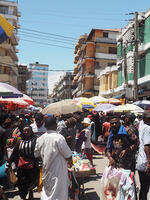
– Evidence from risk-based tax examinations
Risk-based approaches are becoming commonplace for tax authorities as a tool for enforcement. Improvements in technology, technological adoption and in some cases machine learning, hold great promise for finding the taxpayers who are most likely to avoid taxes, thus improving the detection of non...

The next decade is a make-or-break for the world’s most vulnerable countries. To tackle the unprecedented confluence of COVID-19, climate, and economic crises, new solutions are desperately needed. Scientific research is one key for finding long-lasting solutions. Least developed countries (LDCs)...

Tanzania, similar to most sub-Saharan countries, reported its first COVID-19 cases in March 2020. While GDP estimates suggest that the economy was less hard hit than in other African countries, some sectors have nevertheless experienced negative growth. Even with contained GDP contractions in 2020...

In summer 2020 the SOUTHMOD team set out, with partners, to analyse the impact of government policies on protecting households from getting poorer and avoiding societies from becoming more unequal. Now we are releasing a cross-country comparative study that analyses the distributional effects of the...
Working Paper
pdf
– A reflection of practices, policies, and legislation
This paper assesses the participation of female traders, safety factors, and existing policies and legislation in the informal sector in Tanzania. Primary data were obtained from 11 in-depth interviews, 10 focused group discussions, and 236 structured questionnaires. The primary data were...
Working Paper
pdf
In this paper, we investigate the working conditions of the young women working as assistants in the food vending sector in Tanzania using interviews and focus group discussions which are supplemented with quantitative survey. Data were collected in the municipalities of Nyamagana and Ilemela in...
Working Paper
pdf
– Evidence from Tanzania
While technical assistance and increased use of ICT in the area of tax administration have been regarded to hold considerable promise for greater revenue collection, the evidence on how these activities work in the real-world circumstances of developing countries is scant. The paper attempts to fill...
Working Paper
pdf
This paper analyses the distributional effects of the COVID-19 pandemic and related tax-benefit measures in 2020 in a cross-country comparative perspective for five African countries: Ghana, Mozambique, Tanzania, Uganda, and Zambia. We first estimate the impact of the crisis on disposable incomes...

Tanzania is, together with Kenya and Uganda, one of the founding members states of the East African Community (EAC), a regional intergovernmental organization which nowadays consists of six partner states in the region. Since the revival of the new EAC in 2000, EAC Customs Union (EAC-CU) in 2005...
Technical Note
pdf
This note has set out several data processes that have been undertaken using the income data in dataset(s) that underpin SAMOD. Section 1 describes various data-cleaning steps that were undertaken when preparing the LCS 2014/15 as an underpinning dataset for SAMOD. Part 2 elaborates on the process...
Working Paper
pdf
– Imputing employment income in Tanzania and Zambia
The quality of data on employment income is explored using Tanzanian and Zambian household survey datasets. The extent of missing and implausible income data is assessed and four different methods are applied to impute missing or implausible values. The four imputation methods are also applied to...
Working Paper
pdf
This study examines the interaction between formalization of the artisanal and small-scale mining subsector and the regulation of negative environmental impacts in Tanzania. Formalization generally seeks to move the artisanal and small-scale mining subsector to legal status. Using documents, reviews...
Working Paper
pdf
Effectiveness of strategic environmental assessment in promoting sustainable development in Tanzania
This paper examines the extent to which strategic environmental assessment (SEA) is implemented in Tanzania and whether its implementation is in line with generally practised procedures/criteria. Out of 17 completed SEA, eight cases were purposively selected and assessed by applying an analytical...

Researchers and policymakers have long asked whether rural households in Africa diversify their income to spread risk or by seizing opportunities to increase their earning potential. Long-term research in Tanzania shows that diversification is more often a choice rather than a necessity, with the...
Working Paper
pdf
This paper uses the latest Tanzania labour force survey—the Integrated Labour Force Survey—and a censored bivariate probit model to analyse gender differences in labour force participation and gender bias in formal wage employment in urban Tanzania. Our findings indicate that, compared to men, women...
Working Paper
pdf
Although Tanzania has made notable progress in enhancing access to financial services, the gender gap in financial inclusion persists. This paper examines gender disparities in financial inclusion in Tanzania using descriptive and regression analyses. While the advent of mobile phone money services...

Diversifying income sources is an important livelihood strategy for households in low-income countries. Having several sources of income helps in increasing total income, and in spreading the risks. New findings on the benefits of income diversification from Tanzanian households can inform policy...

The private sector and enterprises have a key role to play in the development of the Tanzanian economy. This Policy Brief provides insights and solutions that could offer business sectors the vital policy support that they need to develop and grow. Linkages with large firms provide a possibility for...
Working Paper
pdf
– Application of a structural gravity model
By measuring the effects of forming and joining a regional integration bloc using an augmented structural gravity model, this paper finds that the East African Community (EAC) and EAC Customs Union have significantly enhanced Tanzanian trade into EAC markets. Kenya has continued to be the main...
Working Paper
pdf
– Facilitating inclusion, organization, and rights for street vendors
In spite of having some intensive national strategies to address poverty, Tanzania lacks a coherent national strategy to ensure sustainable livelihoods for those working in its informal economy, of which street vending is an important sector. Based on qualitative, in-depth data collected through...
Report
pdf
View the latest TAZMOD country report here. This report documents TAZMOD, the SOUTHMOD model developed for Tanzania. This work was carried out by University of Dar es Salaam in collaboration with the project partners in the scope of the SOUTHMOD project. The results presented in this report are...
Working Paper
pdf
This paper explores the distributional impact of lowering the value-added tax rate for standard-rated items in Tanzania Mainland. Using a static tax-benefit microsimulation model—TAZMOD—which is underpinned by data derived from the Household Budget Survey 2017/18, reductions in value-added taxes...
Working Paper
pdf
This study sought to examine the main constraints to manufacturing export competitiveness in Tanzania. Using panel data for the period 1997–2018, the study established that supply-side factors dominate demand-side factors in explaining manufacturing export competitiveness. Specifically, the results...

Economics researcher Aimable Nsabimana shares the relevance and inspiration behind his recent work with UNU-WIDER on climate change and human development in Tanzania. How can research contribute to the wellbeing in Africa? In 2019, I spent some months at UNU-WIDER in Helsinki as a Visiting Scholar...
Working Paper
pdf
What drives livelihood diversification among predominantly rural households in developing countries and how can welfare-enhancing patterns be established and sustained in the long run? A large literature has focused on whether income diversification is a means of survival or a means of accumulation...
– Global versus regional value chains
As COVID-19 ravages international trade and production, policy-makers are shifting their sights from global value chains (GVCs) to regional value chains (RVCs) as pathways to industrialization. This blog presents evidence from the textiles and apparel sector in Tanzania, which shows that while GVCs...
Working Paper
pdf
This paper examines the impact of the government input subsidy—the National Agriculture Input Voucher—on farmers’ production and welfare in Tanzania as well as the factors that influence agricultural production in the country. The analysis is based on the Living Standards Measurement Study...
Working Paper
pdf
The implementation of a Single Customs Territory by East African Community countries is intended to ease the movement of goods across borders by cutting costs and time through harmonization and simplification of customs documents, removal of burdensome customs procedures, and automation of customs...
Working Paper
pdf
– The case of Tanzania
Rising public debt in sub-Saharan Africa remains a matter of concern. We provide an analysis of public debt and debt sustainability in Tanzania, focusing on external debt. Though current and previous analyses using the IMF-World Bank debt sustainability framework indicate low risk of public external...
Working Paper
pdf
This paper uses three waves of Tanzanian National Panel Surveys (2008/09, 2010/11, and 2012/13) to construct a panel from 3,676 households that appear in at least two waves to explore the effect of income diversification on household welfare measured in terms of food consumption. The analysis...
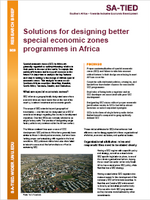
Special economic zones (SEZ) in Africa are generally regarded as underperforming relative to their peers in the rest of the world. To explain this underperformance and to support success in the future it is important to analyse the key features and what is lacking in the design of African special...
Working Paper
pdf
– Gender and innovation
Innovation generally takes place in male-dominated industries. A gender gap might therefore exist. This study used data from the 2015 Tanzania Firm-Level Skills Survey to investigate the gender innovation gap between female-owned enterprises and male-owned enterprises. A non-linear Blinder–Oaxaca...
Working Paper
pdf
– Can linkages with large firms spur the growth of SMEs in Tanzania?
A recent strand of literature on small and medium enterprise (SME) development identifies linkages with large firms as some of the enablers of development and competitiveness. However, there is a dearth of empirical studies on the topic. In this study, we assess the extent and determinants of...
Working Paper
pdf
– Firm-level evidence across geographical clusters in the Tanzanian textiles and apparel sector
Trade-linked technological change has potential to increase incomes in low-income countries (LICs). The most labour-intensive segments of the textiles and apparel global value chain are in LICs. However, gaps between available technologies and best practices make it difficult to adopt more efficient...
– The framing of social protection policies in Tanzania
Until 2010s, social protection was not high on the political agenda in Tanzania. Yet in 2012, the government approved the implementation of a nationwide conditional cash transfer programme. What led the government to commit to a policy area that was otherwise of low priority? The development of the...
Working Paper
pdf
With recent changes in the global economy, policy makers are increasingly turning from global value chains to regional and national value chains as drivers of structural transformation in the global South. This paper examines economic and social upgrading in the Tanzanian textile and apparel sectors...
Working Paper
pdf
Low levels of broadband penetration combined with poor quality of services present a challenge to growth and development in the Southern African Development Community (SADC). This paper performs a comparative analysis of the competitive dynamics of telecommunications markets in four SADC countries...
Working Paper
pdf
The provision of a universal old age pension is increasingly recognized as an important instrument for strengthening and extending social protection. A growing number of emerging economies, including East African countries, are introducing universal old age pensions to guarantee at least a basic...
Working Paper
pdf
– The cases of Botswana, Kenya, Tanzania, and Zimbabwe
The objective of this research is to assess the extent to which export processing zones in Botswana, Kenya, Tanzania, and Zimbabwe integrate the Sustainable Development Goals in their implementation and operations. We focused on four Sustainable Development Goals—gender equality, decent work...
Working Paper
pdf
– Is success influenced by design attributes?
Special economic zones (SEZs) in Africa are generally regarded as underperforming relative to their peers in the rest of the world. This study focuses on the design features of the SEZ in Africa that may help explain this underperformance. Literature was reviewed to identify the key design...
Working Paper
pdf
– Evidence from Tanzania
In this paper, we examine the relationship between childhood exposure to adverse weather shocks and nutritional and health outcomes of children in Tanzania. Using household panel data matched with spatially disaggregated data on weather shocks, we exploit the plausibly exogenous variations in the...
Working Paper
pdf
– A feasibility study
This working paper explores the feasibility of developing a tax and benefit microsimulation model in Zanzibar using the EUROMOD microsimulation software. We review Zanzibar’s tax and benefit arrangements and the potential household survey dataset that would underpin the model, and we conclude that...
Working Paper
pdf
– Dead end or steppingstone?
Despite rapid economic growth in recent decades, informality remains a persistent phenomenon in the labour markets of many low- and middle-income countries. A key issue in this regard concerns the extent to which informality itself is a persistent state. Using panel data from Ghana, South Africa...
Journal Special Issue
This peer-reviewed research is available free of charge. UNU-WIDER believes that research is a global public good and supports Open Access.
– Data, measurement, and trends
Inequality and social exclusion receive considerable contemporary policy attention. In the field of international development, inequality—both vertical (between individuals and households) and horizontal (between groups)—is a core concern in the 2030 Agenda for Sustainable Development. Despite...
Journal Article
This peer-reviewed research is available free of charge. UNU-WIDER believes that research is a global public good and supports Open Access.
– A 25-Year Perspective
Part of Journal Special Issue
Horizontal inequality in the Global South
Working Paper
pdf
We examine the extent to which two of Africa’s leading gold mining economies, Ghana and Tanzania, have adopted transformative local procurement policies to enhance backward linkages from the minerals sector. We assess the impact that evolving legislation in the gold industry has had on...
Working Paper
pdf
Access to mobile phone has increased substantially over the last decade in sub-Saharan Africa. The evidence suggests that increased use of mobile phones in the region has upgraded the market prices received by producers for their cash crops, but so far there is limited knowledge on labour market...

View the latest TAZMOD country report here. This report documents TAZMOD, the SOUTHMOD model developed for Tanzania. This work was carried out by University of Dar es Salaam in collaboration with the project partners in the scope of the SOUTHMOD project. The results presented in this report are...
Journal Article
This peer-reviewed research is available free of charge. UNU-WIDER believes that research is a global public good and supports Open Access.
– The Case of Social Benefits in Tanzania
Part of Journal Special Issue
SOUTHMOD: Modelling Tax-benefit Systems in Developing Countries
Working Paper
pdf
– An application of TAZMOD
This paper analyses the impacts of indirect tax policy reforms on income distribution and poverty in Tanzania by applying a standard static microsimulation model TAZMOD v1.8. The simulations model two indirect tax reforms involving changes to the excise duty and value-added tax rates on alcoholic...
Working Paper
pdf
– Country study—Tanzania
There are large volumes of gas offshore Tanzania, which has raised hopes of a boom. But those hopes look set to be disappointed. A boom would depend on there being a sizeable flow of revenue to government from producing and exporting gas. This paper sets out the scale of the gas, and the array of...
Working Paper
pdf
In this paper we study the impact of tenure security on rural to urban migration of household members over the age of 15. Using three waves of the Tanzanian National Panel Survey (NPS) data, we show that tenure security is associated with lower probability of migration in rural Tanzania. This result...
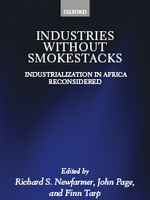
From the book:
Industries without Smokestacks
Working Paper
pdf
– How can policies best create benefits for Tanzania?
Tanzania is rich with natural resources, which have significant potential to contribute to the country’s economic development. Several laws recently passed in Tanzania are dedicated to establishing linkages between foreign firms in natural resource extraction and the local economy. This paper...
Displaying 96 of 204 results
 Join the network
Join the network


